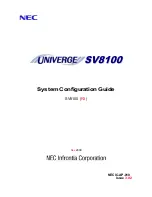
3-32
OPERATION
high-quality receivers. The steep-slope (18 dB/octave) shelving boost cre-
ates a solid, punchy bass from the better consumer radios with decent
bass response. The 6 dB/octave shelving boost is like a conventional tone
control and creates the most mid-bass boost, yielding a “warmer” sound.
Because it affects the mid-bass frequency range, where the ear is more
sensitive than it is to very low bass, the 6 dB/octave slope can create more
apparent bass level at the cost of bass “punch.”
There are no easy choices here; you must choose the characteristic you
want by identifying your target audience and the receivers they are most
likely to be using. Regardless of which curve you use, we recommend a
+2 to +5 dB boost for most formats. Larger amounts of boost will in-
crease the gain reduction in the lowest band of the multiband compres-
sor, which may have the effect of reducing some frequencies. So be
aware the large fixed bass boosts may have a different effect than you
expect because of the way that they interact with the multiband com-
pressor. (The
G
REGG
presets use this effect purposely to create a dynamic
cut in the mid-bass.)
Low Frequency Parametric Equalizer
is a specially designed parametric equalizer
whose boost and cut curves closely emulate those of a classic Orban analog para-
metric equalizer with conventional bell-shaped curves (within
±
0.15 dB worst-case).
This provides warm, smooth, “analog-sounding” equalization.
Low Frequency
determines the center frequency of the equalization, in
Hertz. Range is 20-500 Hz.
Low Gain
determines the amount of peak boost or cut (in dB) over a
±
10
dB range.
Low Width
determines the bandwidth of the equalization, in octaves.
The range is 0.8-4.0 octaves. If you are unfamiliar with using a parametric
equalizer, 1.5 octaves is a good starting point. These curves are relatively
broad because they are designed to provide overall tonal coloration, ra-
ther than to notch out small areas of the spectrum.
The LF parametric can be used in the mid-bass region (100-300 Hz) to add
“warmth” and “mellowness” to the sound when boosting. When cutting,
it can remove a “woody” or “boxy” sound. In our presets, we tend to use
it very sparingly (in the order of 1 dB boost) to add a bit of extra bass
warmth.
One formula for producing a very “big” bass sound on the air is to use a
peaking boost at 100 Hz in combination with a Bass Shelf boost at 6
dB/octave.
The equalizer, like the classic Orban analog parametrics such as the 622B,
has constant “Q” curves. This means that the cut curves are narrower
than the boost curves. The width (in octaves) is calibrated with reference
to 10 dB boost. As you decrease the amount of EQ gain (or start to cut),
the width in octaves will decrease. However, the “Q” will stay constant.
“Q” is a mathematical parameter that relates to how fast ringing damps
out. (Technically, we are referring to the “Q” of the poles of the equaliz-
er transfer function, which does not change as you adjust the amount of
boost or cut.)
Summary of Contents for OPTIMOD-FM 8600
Page 1: ...Operating Manual OPTIMOD FM 8600 Digital Audio Processor Version 4 1 Software...
Page 7: ...Operating Manual OPTIMOD FM 8600 Digital Audio Processor Version 4 1 Software...
Page 60: ......
Page 134: ...2 74 INSTALLATION ORBAN MODEL 8600...
Page 284: ......
Page 312: ......
Page 349: ...OPTIMOD FM DIGITAL TECHNICAL DATA 6 37...
Page 350: ...6 38 TECHNICAL DATA ORBAN MODEL 8600...
Page 351: ...OPTIMOD FM DIGITAL TECHNICAL DATA 6 39...
Page 352: ...6 40 TECHNICAL DATA ORBAN MODEL 8600...
Page 353: ...OPTIMOD FM DIGITAL TECHNICAL DATA 6 41...
Page 354: ...6 42 TECHNICAL DATA ORBAN MODEL 8600...
Page 355: ...OPTIMOD FM DIGITAL TECHNICAL DATA 6 43...
Page 356: ...6 44 TECHNICAL DATA ORBAN MODEL 8600...
Page 357: ...OPTIMOD FM DIGITAL TECHNICAL DATA 6 45...
Page 358: ...6 46 TECHNICAL DATA ORBAN MODEL 8600...
Page 359: ...OPTIMOD FM DIGITAL TECHNICAL DATA 6 47...
Page 360: ...6 48 TECHNICAL DATA ORBAN MODEL 8600...
Page 361: ...OPTIMOD FM DIGITAL TECHNICAL DATA 6 49...
Page 362: ...6 50 TECHNICAL DATA ORBAN MODEL 8600...
Page 363: ...OPTIMOD FM DIGITAL TECHNICAL DATA 6 51 POWER SUPP LY PARTS LOC ATOR...
Page 365: ...OPTIMOD FM DIGITAL TECHNICAL DATA 6 53...
Page 366: ...6 54 TECHNICAL DATA ORBAN MODEL 8600...
Page 367: ...OPTIMOD FM DIGITAL TECHNICAL DATA 6 55...
Page 368: ...6 56 TECHNICAL DATA ORBAN MODEL 8600...
Page 369: ...OPTIMOD FM DIGITAL TECHNICAL DATA 6 57...
Page 370: ...6 58 TECHNICAL DATA ORBAN MODEL 8600...
Page 371: ...OPTIMOD FM DIGITAL TECHNICAL DATA 6 59...
Page 372: ...6 60 TECHNICAL DATA ORBAN MODEL 8600...
Page 373: ...OPTIMOD FM DIGITAL TECHNICAL DATA 6 61...
Page 374: ...6 62 TECHNICAL DATA ORBAN MODEL 8600...
Page 375: ...OPTIMOD FM DIGITAL TECHNICAL DATA 6 63...
Page 376: ...6 64 TECHNICAL DATA ORBAN MODEL 8600...
Page 377: ...OPTIMOD FM DIGITAL TECHNICAL DATA 6 65...
Page 378: ...6 66 TECHNICAL DATA ORBAN MODEL 8600...
Page 379: ...OPTIMOD FM DIGITAL TECHNICAL DATA 6 67...
Page 380: ...6 68 TECHNICAL DATA ORBAN MODEL 8600...
Page 381: ...OPTIMOD FM DIGITAL TECHNICAL DATA 6 69...
Page 382: ...6 70 TECHNICAL DATA ORBAN MODEL 8600...
Page 383: ...OPTIMOD FM DIGITAL TECHNICAL DATA 6 71...
Page 384: ...6 72 TECHNICAL DATA ORBAN MODEL 8600...
Page 385: ...OPTIMOD FM DIGITAL TECHNICAL DATA 6 73...
Page 386: ...6 74 TECHNICAL DATA ORBAN MODEL 8600...
Page 387: ...OPTIMOD FM DIGITAL TECHNICAL DATA 6 75...
Page 388: ...6 76 TECHNICAL DATA ORBAN MODEL 8600...
Page 389: ...OPTIMOD FM DIGITAL TECHNICAL DATA 6 77...
Page 392: ...6 80 TECHNICAL DATA ORBAN MODEL 8600...
Page 393: ...OPTIMOD FM DIGITAL TECHNICAL DATA 6 81...
Page 394: ...6 82 TECHNICAL DATA ORBAN MODEL 8600...
Page 395: ...OPTIMOD FM DIGITAL TECHNICAL DATA 6 83...
















































